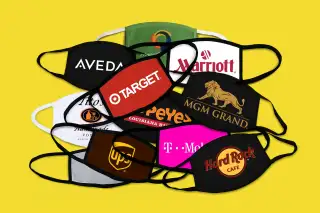The Swag Must Go On: Big Companies Are Rushing to Slap Their Logos on Face Masks and Hand Sanitizer

Before the pandemic, Tami and Wayne Cimperman’s top-selling products were rhinestone-encrusted drink tumblers — glittery totems to T-Mobile, Coca-Cola, and other famous brands that were given away at marketing events, product launches and the like.
As president and vice president, respectively, of Foxyware, a company that makes items organizations pay to stamp their name on, the Cimpermans had to switch gears when COVID-19 hit, reorienting their Port St. Lucie, Fla.-based business to meet the growing demand for face masks branded—and in some cases, bedazzled—with corporate logos.
“The face mask market is exploding, with more and more states making it mandatory to wear one,” Wayne says. “It’s probably the best premium advertising anybody can get ... because it’s on your face.”
In the absence of trade shows, conferences and other marketing opportunities where brands have traditionally set up booths and passed out keychains and tote bags en masse, companies are working overtime to figure out how to get people to see their logos. For corporate America, branding products pertaining to health and hygiene is the next logical manifestation of marketing through a pandemic — the tangible iteration of all those cloyingly heartfelt TV commercials and "we're all in this together" social media posts.
Corporate tchotchkes might seem like little throwaways to most of us, but the promotional products business—as it’s formally known—is a nearly $25 billion industry, according to the trade group Promotional Products Association International (PPAI).
Companies give away free T-shirts and stress balls to build brand loyalty and goose sales, according to PPAI president and CEO Paul Bellantone. “Promotional products affect behavior,” he says.
Some companies that make and distribute corporate-branded products say they've actually seen business pick up since COVID-19 struck, simply because demand for these protective items has been so high. Wayne says roughly 90% of his current orders are for branded face masks, adding that he had to hire workers to keep up with demand.
“I can't think of any type of business we have not sold to," he says. “This, by far, outpaces any product rollout we’ve had."
It's not just face masks—which companies can get custom-printed for as little as a few bucks each—that are flying off shelves. As the U.S. confronts the ongoing wave of COVID-19 infection, popular promotional products include low-cost personal protective equipment (PPE) staples like gloves, face shields, hand sanitizer (in configurations ranging from keychain attachments to pen-shaped mist sprayers) and high-tech, pricier offerings like ultraviolet "wands" and boxes built to kill germs that lurk on keyboards and cell phones and can cost in the neighborhood of $25—or more—apiece.
Products that make it easier to juggle the blizzard of federal, state and city-specific health recommendations are also gaining traction.
Leo Friedman, CEO and founder of Chicago-based iPromo, says one of his company's "sleeper" hit products is a headband with buttons or knots (there are a few different styles) on the sides for attaching mask ear loops. “Another product I love — and Apple bought like 80,000 pieces of this thing — is a hand sanitizer bracelet,” he says.
All told, iPromo has sold in excess of 100 million units of PPE, Friedman says.
It takes a certain finesse to effectively brand precaution. Companies want to be seen as benevolent entities that care about their customers, not opportunists chomping at the bit to exploit the nation's COVID-19 fears.
Another big puzzle companies now face is figuring out how to get all this logo-festooned stuff into customers’ hands in the first place, since big events awash in sponsored swag are on hold for the foreseeable future. Bellantone says many companies have resorted to snail-mailing items to people’s houses. “We’re seeing more delivery directly to the consumer or the employee or the recipient of the product," he says.
When possible, face-to-face giveaways are still a popular distribution method. Wayne Cimperman says Foxyware recently made a batch of masks for a hotel brand to hand out to guests at check-in, and says other in-store giveaways have become popular in the retail and service industries.
“I’m getting calls from restaurants, hair salons, bars, grocery chains — everyone,” he says.
More from Money:
Napper’s Delight: How Coronavirus Normalized the Afternoon Snooze for America’s Burnt-Out Workforce
Social Distancing at Work Is Going to Be Even Harder Than We Think
Becoming a Homeowner Isn't Easy. Here's How Three Black Families Did It